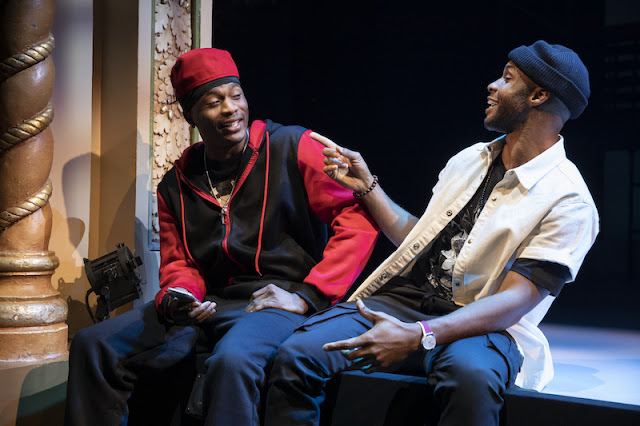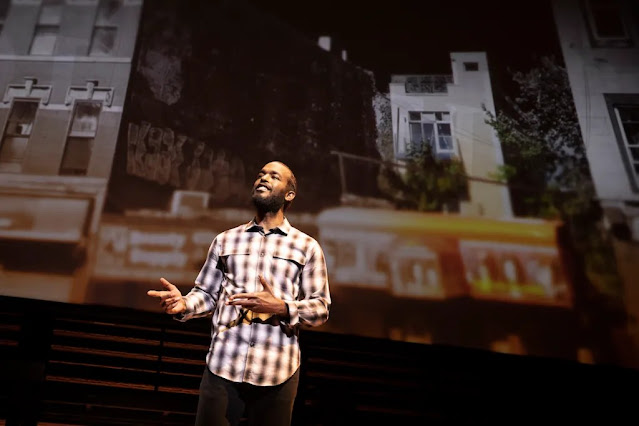 |
| Luke James, Esau Pritchett, Da'Vinchi, Forrest McClendon, Dyllón Burnside, Tristan Mack Wilds, Bryan Terrell Clark. All photos: Julieta Cervantes. |
 |
| Tristan Mack Wilds, Dyllón Burnside, Forrest McClendon, Da'Vinchi. |
Thoughts of a Colored Man combines poetry, drama, music (limited but effective), and comedy in a series of scenes, songs, and monologues that purport to share things that African-American men have on their minds. As others have noted, it’s broadly reminiscent of Ntzoke Shange’s For Colored Girls Who Have Considered Suicide/When the Rainbow is Enuf. Not until the end do we learn the names of its thus far anonymous men, and they’re all allegorical: Love (Dyllón Burnside), Happiness (Bryan Tererell Clark), Lust (Da’Vinchi), Passion (Luke James), Depression (Forrest McClendon), Wisdom (Esau Pritchett), and Anger (Tristan Mack Wilds).
 |
| Da'Vinchi, Dyllón Burnside. |
Those names are absolutes that make the men seem less
dimensional than what we actually see. While Wisdom, for example, definitely
could be ascribed to the patriarchal Nigerian-American who runs Joe’s Barber
Shop (and, therefore, could simply be called Joe), he also displays aspects of
the other concepts, as do his fellow characters. Most share traits of
love, anger, passion, depression, and happiness, although lust is perhaps not
so much in evidence, even in the character who gets the name.
 |
| Luke James, Esau Pritchett, Da'Vinchi, Dyllón Burnside, Tristan Mack Wilds, Forrest McClendon. |
Regardless, the play serves as a smorgasbord of writing
styles, from hip-hop rhymes to barbershop sitcom to poetic lyricism, showing
Scott’s verbal skills and humanistic nature, allowing his characters to express a range of mostly familiar tropes about being Black. Or, more specifically, being a Black man living in a largely Black neighborhood, like
Brooklyn’s Bedford-Stuyvesant.
 |
| Luke James. |
Familiar as the issues are, it’s the often humorous and/or
insightful way they’re dramatized, discussed, or described that keeps us engaged,
creating that shared feeling of communion. At the Saturday matinee I attended,
the audience consisted largely of people of color. There was an electric connection
between what was happening on stage and how it was being received in the house,
with murmurs of “uh-huh,” “mmm,” “that’s right,” and other signs of approbation.
 |
| Da'Vinchi, Dyllón Burnside. |
Vividly staged by Steve H. Broadnax III, the scenes roll forth on Robert Brill’s spare set dominated by a slightly elevated, bench-like metal platform running from one side to the other. It’s brilliantly lit by Ryan O’Gara, and backed by Sven Ortel’s projections of local cityscapes lightly overlaid by the word “COLORED.” Toni-Leslie James and Devario D. Simmons provide excellent urban costumes using red, gray, black, and white; Mikaal Sulaiman’s complex sound design is an exceptional adjunct to the atmosphere; and the music and lyrics of Te’la and Kamauu, as well as playwright Scott, are welcome ingredients.
A central dramatic context tying everyone together is a
barbershop, apparently as much an iconic locale in the Black community as the church; in
fact, its pastor-like proprietor is as much a curator of his customers' hearts and souls (he even keeps a "swear jar" to prevent cussing) as he is of their head and facial hair. This is especially palpable in Mr. Pritchett's performance, his presence and voice being as richly charismatic as any megachurch preacher’s.
The characters are sufficiently distinct from one another, and each actor gets multiple
chances to glow. Some characters may be irritated enough by life’s shittiness to
instigate quarrels but they come down more on the side of saintliness than its
opposite. Only when a brief collage about Black on Black violence is presented
late in the play does that particular issue make its presence known.
Among the prominent themes are Black consumerism as
represented by the desire for Air Jordan sneakers; the exploitative way that
colleges overlook the “student” part of their “student-athletes”; the problems
represented by Black fatherhood; the sacrifice young men make for the sake of
needy family members; the gentrification of Black neighborhoods; the dimensions
of Black masculinity, not to mention homophobia; identity issues faced by the
Black middle class; poverty (three guys even do a comic riff on whose childhood was poorer), and so on.
There’s little new here, or particularly provocative, and much of it has an undeniable air of preachiness bordering on overstatement. While there’s no plot to speak of, a few things happen, friendships emerge, and minor conflicts are resolved. Nonetheless, apart from there being too many set pieces delivered via direct address rather than in dramatic conversation, the play manages to hold your interest.
 |
| Luke James, Esau Pritchett, Da'Vinchi, Forrest McClendon, Dyllón Burnside, Tristan Mack Wilds, Bryan Terrell Clark. |
Thoughts of a Colored
Man receives outstanding support from a dynamic cast that deserves to be a
contender for any awards given for the season’s best ensemble. The actors
achieve a true communion among themselves on the John Golden’s stage, but it’s
the one they create for the audience that makes their work memorable.
John Golden Theatre
252 W. 45th Street, NYC
Open run


